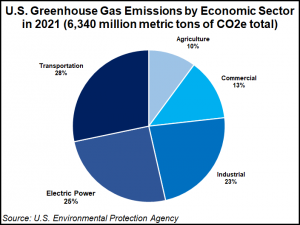SUMMARY: In this document, the Environmental Protection Agency (EPA) is proposing five separate actions under section 111 of the Clean Air Act (CAA) addressing greenhouse gas (GHG) emissions from fossil fuel-fired electric generating units (EGUs). The EPA is proposing revised new source performance standards (NSPS), first for GHG emissions from new fossil fuel-fired stationary combustion turbine EGUs and second for GHG emissions from fossil fuel-fired steam generating units that undertake a large modification, based upon the 8-year review required by the CAA. Third, the EPA is proposing emission guidelines for GHG emissions from existing fossil fuel-fired steam generating EGUs, which include both coal-fired and oil/gas-fired steam generating EGUs. Fourth, the EPA is proposing emission guidelines for GHG emissions from the largest, most frequently operated existing stationary combustion turbines and is soliciting comment on approaches for emission guidelines for GHG emissions for the remainder of the existing combustion turbine category. Finally, the EPA is proposing to repeal the Affordable Clean Energy (ACE) Rule.
DATES: Comments must be received on or before July 24, 2023. Comments on the information collection provisions submitted to the Office of Management and Budget (OMB) under the Paperwork Reduction Act (PRA) are best assured of consideration by OMB if OMB receives a copy of your comments on or before June 22, 2023.
ADDRESSES: You may send comments, identified by Docket ID No. EPA–HQ–OAR–2023–0072, by any of the following methods:
>> Federal eRulemaking Portal: https://www.regulations.gov, (our preferred method). Follow the online instructions for submitting comments.
>> Email: a-and-r-docket@epa.gov. Include Docket ID No. EPA–HQ–OAR–2023–0072 in the subject line of the message.
>> Fax: (202) 566–9744. Attention Docket ID No. EPA–HQ–OAR–2023–0072.
>> Mail: U.S. Environmental Protection Agency, EPA Docket Center, Docket ID No. EPA–HQ–OAR–2023–0072, Mail Code 28221T, 1200 Pennsylvania Avenue NW, Washington, DC 20460.
Instructions: All submissions received must include the Docket ID No. for this rulemaking. Comments received may be posted without change to: https://www.regulations.gov, including any personal information provided.
#######+++++++#######+++++++########
Amplifying Democracy: The 26th Amendment and the Power of Young Voters
FROM: Nile Blass, US League of Women Voters, June 20, 2023
WHAT: Join the League of Women Voters and partners for a virtual panel discussion on the 26th Amendment and the game-changing influence of young voters in America.
Hear from on-the-ground organizers as we explore how youth empowerment has reshaped the political landscape and how we can bring more diverse young voices into our work.
WHEN: Thursday, July 6, 2023, 5pm ET
>>> Register Here Now or ASAP!
We look forward to seeing you for this virtual event!
League of Women Voters, 1233 20th Street NW, Suite 500, Washington, DC, 20036


{ 1 comment… read it below or add one }
strong>PROPOSED NEW EPA GREENHOUSE GAS RULE ~
This is the new Greenhouse Gas rule that is intended to replace the Trump-era Affordable Clean Energy Rule which replaced the Obama-era Clean Power Plan. The proposed rule requires a tiered approach, mandating 90 % Carbon Capture and Sequestration for fossil-fuel plants running after 2040 (Longview?) and requiring co-firing with green hydrogen for baseload plants running after 2035 (e.g., Harrison?). These would need to be installed by 2030. The rule is complex, with various categories of plants assigned based on capacity factor and other factors.
The rule is estimated to save 1300 lives per year just from the health benefits. The health impacts result in a net economic benefit estimated at over $5 billion per year.
Since both the CPP and ACE were overruled by the courts, this rule appears to be focused on “inside the fence” approaches. Note that WV Attorney General Morrissey opposed the CPP because it included “outside the fence” approaches that would save money. But requiring inside-the-fence technologies means that CCS has been defined as the “Best System of Emissions Reduction ” (BSER). I will argue that Morrissey’s lawsuit may actually have backfired, because the CPP rules were much more favorable for fossil fuels (especially gas) than this proposed rule.
The comment period was extended to August 8, and EPA expects to finalize a rule early next year.
Full details at:
https://www.epa.gov/stationary-sources-air-pollution/greenhouse-gas-standards-and-guidelines-fossil-fuel-fired-power#rule-summary
Jim Kotcon, WV Sierra Club, Morgantown, WV
P.S. Note that the Sierra Club’s position is generally supportive of the proposed rule, but we urge that it be implemented sooner. There are also concerns that mandates for CCS will extend the life of plants, leading to continued mining and drilling impacts.